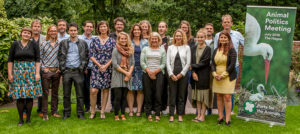Movimiento internacional en expansión – Reunión de Animal Politics en La Haya
Entre el 14 y el 17 de julio, los partidos animalistas de Europa se reunieron en La Haya con motivo del encuentro anual de la fundación Animal Politics. Estos partidos forman parte de un movimiento internacional en expansión de asociaciones y partidos que en vez de dar prioridad a los intereses a corto plazo del ser humano, luchan por la defensa del planeta en su conjunto y todos sus habitantes. Los elementos más importantes de este encuentro de tres días fueron la transmisión de conocimientos, el intercambio de experiencias y el refuerzo de la colaboración. La organización corrió por cuenta de la fundación Animal Politics, encargada de coordinar las actividades internacionales del Partido por los Animales.

Ya hay en el mundo más de quince partidos que trabajan por los intereses de los animales, la naturaleza y el medioambiente, y el número sigue aumentando, de la misma forma que aumenta el número de simpatizantes y se logran nuevos éxitos. No solo en Holanda, sino también en Portugal (PAN), Alemania (Tierschutzpartei), Australia (Animal Justice Party) y Taiwan (Trees Party), estos partidos tienen uno o más representantes en las instituciones.
En Portugal, el PAN ya tiene tres concejales y desde el año pasado, también está representado en el parlamento nacional. El PACMA, el partido español, hizo historia en las elecciones generales del pasado junio, con 284.000 votos en el congreso y 1,2 millones de votos en el senado. A pesar de esta elevada cifra de votos, el partido no obtuvo ningún escaño a causa de la ley electoral española. Pero esto no significa que el partido no tenga influencia. Los partidos animalistas son como la liebre en la maratón. Gracias al PACMA, por ejemplo, este año no se celebrará el Toro de la Vega, un evento en el que cientos de hombres acosan a un toro armados con lanzas, hasta matar al animal.
En el Reino Unido, el Animal Welfare Party se presentó por primera vez a las elecciones en Escocia e Irlanda del Norte. En Londres, el partido obtuvo el 1% de los votos. El Partido por la Justicia Animal de Finlandia consiguió las firmas necesarias para registrarse oficialmente como partido. Y en Australia, el Partido por la Justicia Animal también creció en las elecciones de este mes, lo cual se puede traducir en un escaño en el senado de Victoria.
From 14 to 17 July 2016, European parties for animals gather in The Hague for the annual Animal Politics Meeting. They are part of a growing worldwide movement of groups and parties that do not put the short-term interests of man in the pivotal position, but the entire planet and áll her inhabitants instead. During the meeting in The Hague transferring and exchanging knowledge and strengthening cooperation are key ingredients. The conference is organised by the Animal Politics Foundation, the foundation responsible for the Party for the Animals’ international activities.

At the moment, there are over 15 parties for animals worldwide that are dedicated to the interests of animals, nature and environment in politics. In The Netherlands (Partij voor de Dieren), Portugal (PAN), Germany (Partei Mensch Umwelt Tierschutz), Australia (Animal Justice Party) and Taiwan (Trees Party), these parties have representatives. The number of parties for animals is still growing, and so is their support.
In Portugal, the party for People, Animals and Nature (PAN) is represented in three councils, and since last year also in national parliament. PACMA, the Spanish party for animals, wrote history in the national elections of last June with over 284,000 votes for the Congress and 1,200,000 votes for the Senate. Despite the large number of votes, the party is not awarded any seats in the parliament – unprecedented in Spanish parliamentary history. This is because of how the electoral system and the electoral district work in Spain. However, not having a seat does not mean not having influence. Parties for animals are like pacers in the marathon. In Spain, thanks to PACMA there will be no Tora de la Vega festival this year, an event where hundreds of men chase after a bull and then kill it with lances.
In the UK, the Animal Welfare Party was standing for the first time in Scotland and Northern Ireland, and in London they got almost 1% of the votes. The Finnish Animal Justice Party succeeded in getting enough signatures to register the party officially. In Australia, the elections earlier this month show that the support for the Australian Animal Justice Party is growing, which in Victoria may result in a seat in the Senate.
At the Animal Politics Meeting subjects such as preparing for the next elections, building a strong party structure and campaigning experiences are shared by the seven countries attending.